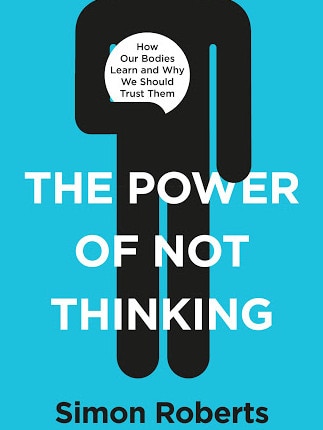How the elites can help your business grow
Leave the PowerPoint in the office and start listening and learning in the real world

Five years ago, London’s Financial Times published a letter from a British anthropologist, Simon Roberts, who in a prescient aside questioned the growing gulf between populations and elites or experts.
“The view from below,” he wrote, “has never felt so out of kilter with the view from above … how to bridge this gulf in understanding and apparent absence of empathy?”
In a new book published in Australia this week, The Power of Not Thinking: How Our Bodies Learn and Why We Should Trust Them, Roberts sets out to answer his own question, arguing that business and political decision-makers should rethink their reliance on big data alone and explore ways to glean a more visceral understanding of what matters to people out in the world.
“Think about driving a car: I’m teaching my son at the moment and it is so difficult to put into words how we change gears once we’ve learnt — it’s the feel of the clutch on your foot, the sound the gearbox and engine make,” he tells The Deal.
“This is just one example of the vast and sophisticated knowledge that is unconsciously picked up by our bodies and which we use in every area of our lives. PowerPoint presentations flatten out the world, take the richness out of an experience … we want business and politicians to come along for the ride, to experience the world as we do.”
Roberts is one of the world’s leading business anthropologists and his toolkit is not dissimilar to that of his more traditional colleagues who walk in their human subjects’ shoes to observe and try to understand them. However, his fieldwork involves taking leaders and innovators working at the top of some of the world’s biggest companies — from Google, Spotify and Facebook, to Procter & Gamble and other Fortune 500 behemoths — out of their own worlds and into the lived experience of their clients.
“I know, I know in lockdown there’s an irony to us discussing all this right now as well as writing a book about living experience,” he says with a laugh from his East Sussex home.
Roberts talks with genuine excitement about subverting normal business research methods — consultants going out and then reporting back in — and a first experiment when he asked Duracell executives to hike a wilderness area of a San Diego national park and set up camp in subzero temperatures.
It was a difficult time for the company, which was on the cusp of being sold to Warren Buffett’s Berkshire Hathaway. The stakes were high in this risky push into the outdoor market.
The group found it difficult at first but were able to “feel” the trust that climbers and outdoors enthusiasts place in their kit, their light, heat and power sources. They returned enthused by what they had experienced. The team went on to create the most successful integrated communications plan in the company’s history, including a YouTube short film starring a free climber. The film went viral and achieved eight million views.
Most recently, Roberts says he has taken a team from Spotify to explore users’ relationships with music. They spent days riding around with Uber drivers in two US cities: “They got so much insight just from snatched conversations. I can’t say too much, but it was a profound experience for them, important for a platform that not only provides music you like but which must write algorithms for music you might like.”

Roberts’ book draws on his professional experience to articulate a return to valuing and understanding our bodies and intuition as an integral part of our “intelligence”. But he also offers an eminently readable history of how philosophers and scientists over the past two centuries have contributed to the mind versus body argument.
From Descartes “cogito, ergo sum” (I think therefore I am) to the Hungarian/British polymath, Michael Polanyi, exponent of what he called “tacit knowledge” to cutting-edge, 21st-century neuroscience laboratories, Roberts tracks the journey in Western thought that associated the brain with the rational, objective view of the world and relegated bodily experience to a secondary tier of response and intelligence.
“We’ve opted for dry and factual representations of the world, which provide a partial account of how it is and how it feels,” he says. “At worst, the body has been dismissed as a source of merely subjective or even misleading information.”
These reductionist tendencies, Roberts argues, are becoming increasingly evident in the way governments make policy and run countries and the way businesses make corporate decisions relying on digital technology, big data, artificial intelligence and machine learning. All these aim to reduce knowledge to their most basic level.
Explaining what embodied knowledge is and how it is acquired, he says, requires some theoretical understanding but, ultimately, it is about practical forms of cognisance which are both valuable and eminently transferable.
Glassblowing, like driving a car or riding a bike, is another powerful example of expertise gained through repetition and practice, adapting to different circumstances and environments, and requiring the ability to deal with unforeseen situations and at times to improvise.
It is this instant, learned but intuitive decision making, free of rules and constraints, that Roberts argues will always place a limit on the capabilities of artificial intelligence or the development of fully automated cars, for example.
The book also explores how neuroscience has discovered and mapped brain activity which shows that empathy is not learned through intellectual or theoretical understanding but through our bodies: as we watch other people, observe their actions and intentions, emotions and feelings our bodies spark “mirror neurons” in our brains, which allow us to walk in others’ shoes.
Executives, he says, often talk of gut instinct about a deal or situation, an expression of a type of learning acquired through the body.
Politicians, he says, would do well to take a leaf out of business: go out and really walk in the shoes of others because that is the way empathy is learnt.
-
The Power of Not Thinking: How Our Bodies Learn and Why We Should Trust Them (published by Blink, distributed here by Allen & Unwin, $39.99)



To join the conversation, please log in. Don't have an account? Register
Join the conversation, you are commenting as Logout